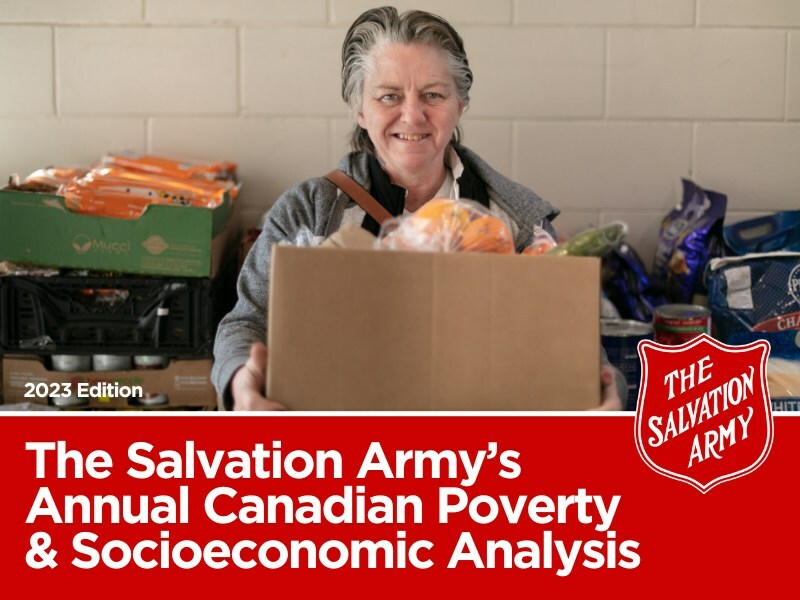2023 Canadian Poverty and Socioeconomic Analysis reveals growing demand for social services, allows The Salvation Army to better serve those in need.
New research from The Salvation Army Canada finds that Ontarians are struggling to meet their basic needs with inflation, food affordability and health concerns persisting as top issues. Single parents, caregivers and single-person households are facing the most pressure, demonstrating how these struggles are not felt equally by all Canadians.
The Salvation Army surveyed more than 1,500 Canadians to produce the 2023 Canadian Poverty and Socioeconomic Analysis in order to better understand their attitudes, behaviours and experiences on issues such as the availability of housing and food, general affordability and related health outcomes. As one of the largest non-governmental direct providers of social services in Canada, this data helps The Salvation Army to quantify the demand for ongoing social services provided and helps the organization to better serve those in need.
The research shows Ontarians rank food security (77%), managing limited resources (73%) and their mental and physical well-being (60%) as top concerns.
These findings are in line with The Salvation Army’s internal data, which reveal an increase in the number of households seeking assistance, as well as individuals seeking clothing, furniture, emergency housing and winter coats.
“The figures from our research show that Ontarians are struggling, particularly in rural Ontario where 80% of respondents are worried about food insecurity,” says Glenn van Gulik, Salvation Army Canada Divisional Secretary for Public Relations. “There is a palpable sense that there’s no relief forthcoming in the short term, and that people are on their own.”
The report finds that Ontarians are hoping to see financial pressures ease somewhat over the next six months, but they are still expecting food security, limited financial resources, health issues and housing insecurity to persist. As a result, The Salvation Army expects to sustain current levels of service to support Canadians dealing with these ongoing challenges and will continue to leverage this data and internal metrics to help direct resources where they’re needed most.
Nationally, the report finds that single parent families are facing the highest degree of hardship across the country. While 25% of Canadians fear they do not have enough income to cover their basic needs, that number climbs to 40% for single parent households, single person households (31%) and caregivers (30%). Twenty-one per cent of respondents reported skipping or reducing the size of at least one meal because they cannot afford to buy groceries, but that number jumps to 45% among single parents. Twenty-two per cent of parents also reported eating less so their children or other family members could eat (44% among single parents).
In 2023, due to the ongoing impact of inflation, support for priority communities, individuals and families is as important as ever. While The Salvation Army offers assistance across a broad range of services, most supports provided were related to food assistance and meal programs.
“We understand that for many Canadians, this is a very difficult time,” says van Gulik. “It is taking a toll on the emotional, mental and physical well-being of our communities. These are our friends, family and neighbours, and an increasing number of them are turning to The Salvation Army for support.”
Last year, The Salvation Army helped more than 2.7 million people across Canada, providing 3.9 million meals, assisting 359,000 with Christmas food hampers and toys, and over 1.5 million people with food, clothing or practical help.
